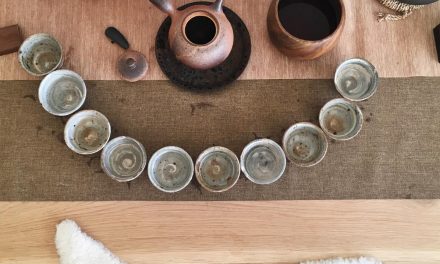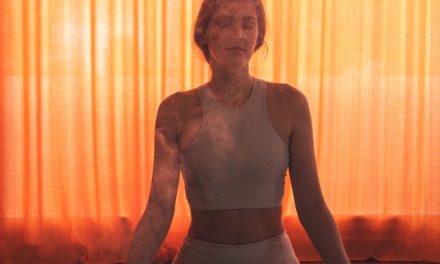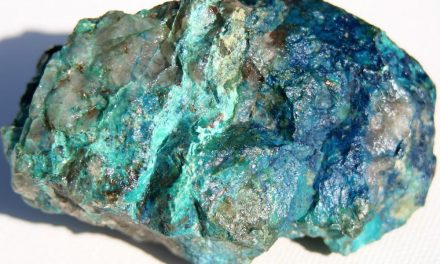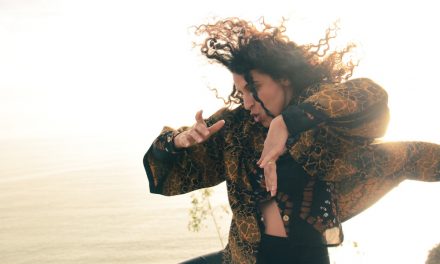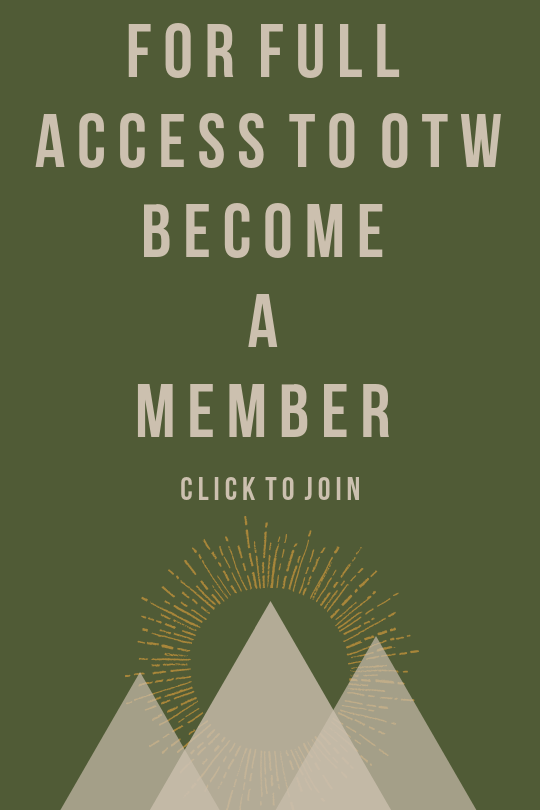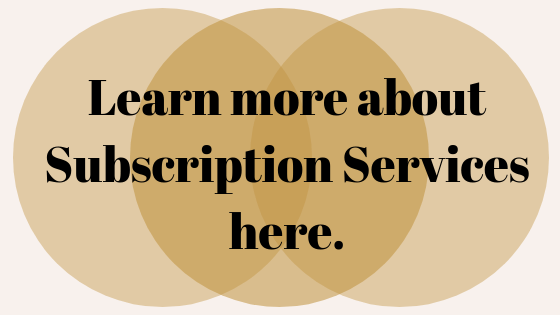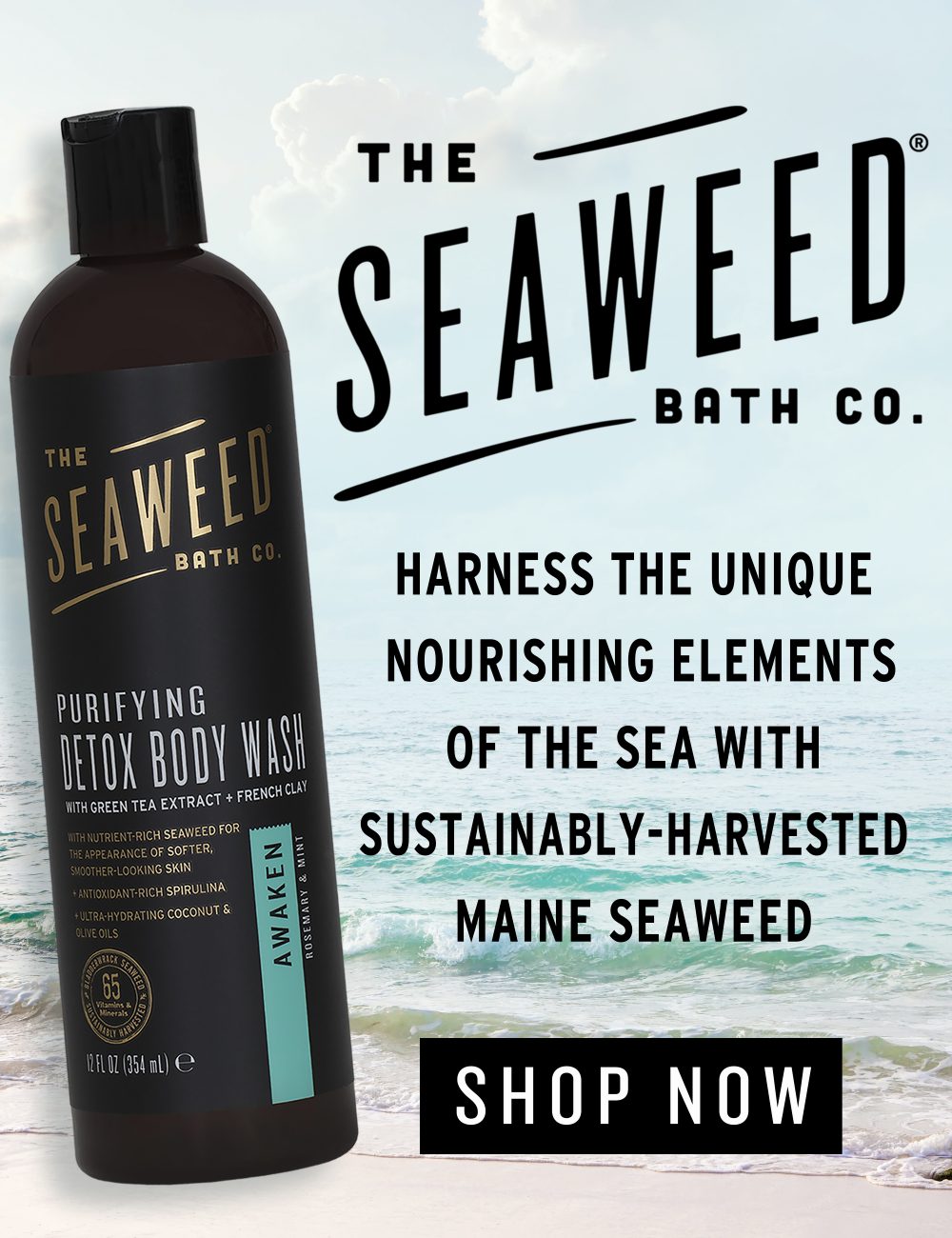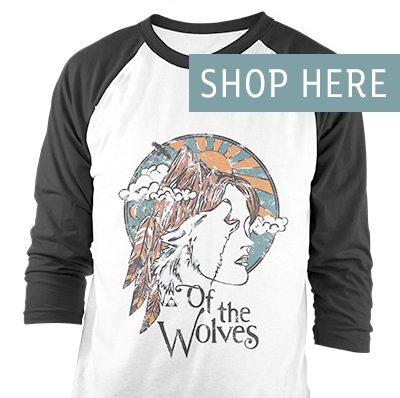Jonah Matranga: The Artist Alone, Rewinding
The catharsis that music affords was my therapy almost all of my life. I had my friends through the stereo – we shared wounds, fears, romantic longings and existential crises. Our stories intermingled, and this only child and fiercely independent girl was never truly alone. After college, I exchanged my professional writing and film studies undergrad degree for a seat at the table in the entertainment industry. As I began working in music in the mid 2000s, Jonah resurfaced for me. “Hot Little Pony” (Jonah, where did that even come from?!). I received that email from a music supervisor friend one day. Far was reuniting under the moniker Hot Little Pony and playing the Troubadour, a storied Los Angeles venue, and because my friend and I a year prior had bonded over our love for FAR and Onelinedrawing, amongst other bands who had long since quit making music, he informed me we would undeniably be there. He already purchased the tickets. That night, I saw so many friends and business colleagues who turned out to be ardent Far fans, too.
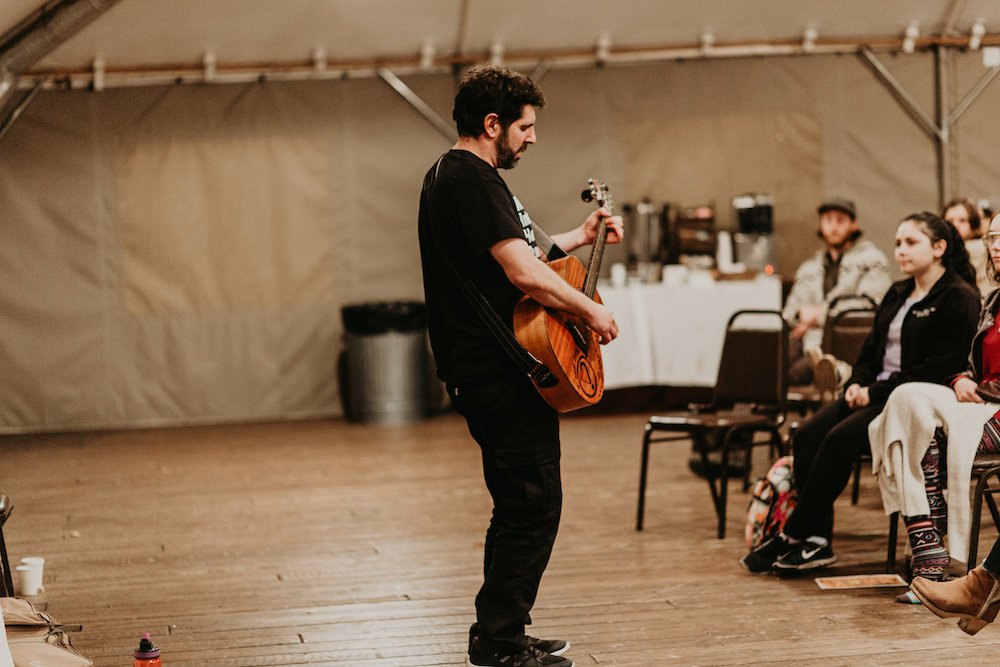 Photo by Mari Trancoso for Of The Wolves REWILDING retreat
Photo by Mari Trancoso for Of The Wolves REWILDING retreat
As the years wore on and I continued to work in music, I lost track of Jonah’s infinite creative output. And then I began following him again. What a “friend” to return to: a talented musician and heart-forward songwriter, a developed vocal and fearless activist, and the poster boy for DIY – self-publishing his first book, writing songs for hire to score sentimental moments for fans (birthday, engagement, you name it) and touring the world with little pretense. I reached out to him last year to introduce myself and ask for an interview. I knew he had so much to share with our audience (See his TEDx talk here). Little could I know he would then accept an invitation to speak and perform at our first REWILDING retreat. We still hadn’t met, hadn’t even gotten the interview in. Jonah leaps, and he trusts. He drove down from Oakland to Santa Barbara, with his big grin and guitar ready to join in the fun.
So, following are highlights from our conversation earlier this year and some choice torrents of knowledge that sprang easily from Jonah. May I suggest you read this while listening to the following songs from some of Jonah’s bands and solo work, not necessarily in this order. All can be found on Spotify or most places you listen to music!
- “Stay”, Onelinedrawing
- “Bury White”, Far
- “I Like It”, Far
- “At Night We Live”, Far
- “Deafening”, Far
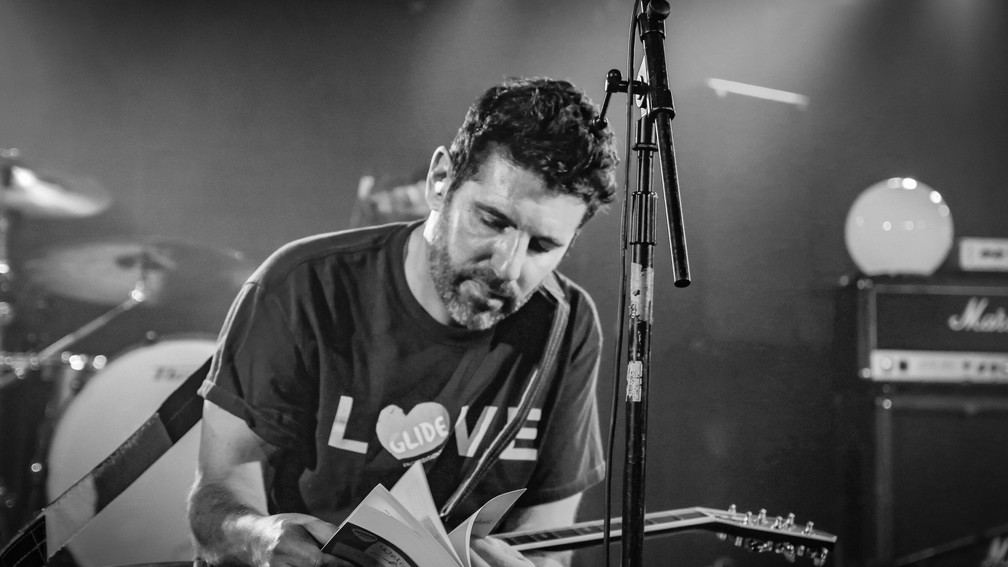 Photo by Liliana Burke
Photo by Liliana Burke
Jonah on the philosophy and delusion of the rockstar.
When I started making music, like I’m sure a lot of young people starting to make music now, there were all sorts of dreams in my head. There’s this real nip of the rockstar life. We literally have a term in our culture called “rockstar”, that has nothing to do with music – you know, being a rockstar. There is a lot built up around that concept of life, and honestly, I’ve seen a lot of people chase it and really end up unhappy. So, early on, I realized that it wasn’t enough just to choose a musical life. A lot of people think of making a life much like making a painting, but it’s almost a bit more like making a sculpture out of rock, where you chip away at the parts that aren’t needed to get to the shape that is actually needed. That’s what I’ve thought about my life and my art making for a long time now. The past 10 years especially have been about honesty, being really picky and self-indulgent when it comes to where I play and when and why. It’s not that I have a lot of money, but I’ve really made a lot of conscious choices to need little. So, generating it can be as creative as possible and not sort of required by any number of expenditures.
On writing a book, “Alone Rewinding”, forcefully sitting still, and creating.
The past 10 years have been a real letting go of things. I still record, I still travel, but I definitely travel less and I’m just honestly spending more and more time in contemplation. Writing a book “Alone Rewinding” – that was a big exercise. It really started with, ok, I want to stay home for a while. I wanted to use my brain in a little bit of a different way than just making songs, too. So, I created a Kickstarter for this book and was ambitious with my ask. I knew that making a book was gonna take a lot, and I wanted to see if anyone else gave a shit. I wanted to have enough coming in so I wasn’t sweating putting a tour together, and that was scary for me. Because touring for me, outside of the income thing, is a huge part of my identity. It’s what I love.
Creating the book was a little bit sad in that way, not touring as much. It’s fun out there. It’s lonely and tiring and a bunch of other things, too, but to me, there’s a real sweetness to it. I figured if I have any preconceptions that I’m residing myself to, I need to challenge those preconceptions now. The book is really me settling down. There’s a writer – I think his name is Edward Abbey, and he wrote something really great about writers block. People were complaining about writers block, and he said: ‘Just go and sit in front of your typewriter, your pen and paper, your computer, whatever it is and sit and be with it. You’re not allowed to write, you’re not allowed to do anything but sit. And sit there for 8 hours the first day and 8 hours the next, and by the third day if you aren’t writing, then you have nothing to say.’ I thought that was really great. And that’s kind of what I did.
The book is me doing the best I can to tell the story of being a working artist and raising my daughter. It was a really great, reflective time after a couple of decades of doing music for a living to really kind of take a beat and go, ‘what, what happened, what led to this?’ I didn’t tour for a long time, the longest in my adult life. Now, I’ve toured a few times since the book is out, and it’s really wonderful. It’s reignited my love just for singing for people, just that simple act. I’m actually really looking forward to singing in a bunch of bookstores! I’ve found it’s really fun to read a little bit from the book and then play the songs that the graph is either directly or indirectly related to. I’ve had a lot of people telling me that they have listened to my music for a long time, that they’re hearing the songs in entirely different ways after reading the book and reading about sort of where I was at in my life when I wrote a certain song. That’s been really beautiful.
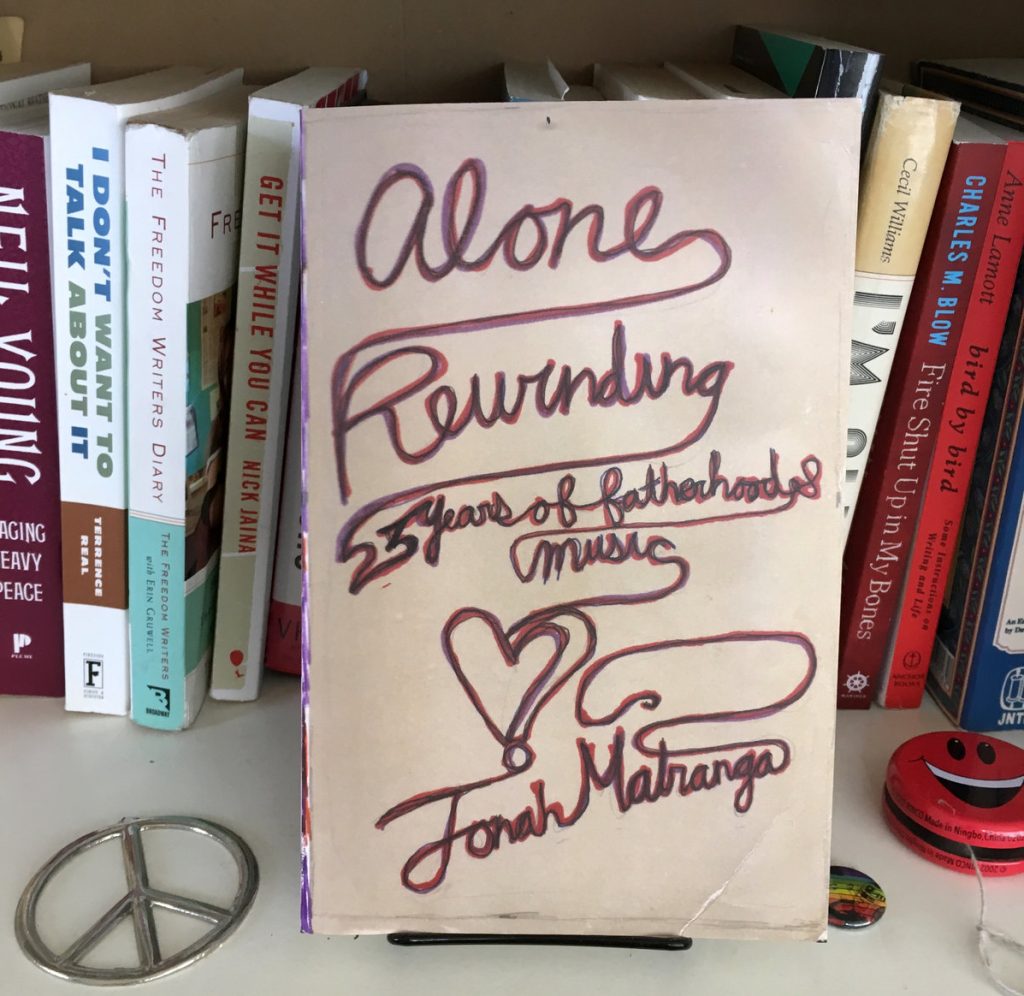
On where it started and round-numbered milestones.
My first band was called Far, and we made our record Water and Solutions in 1998 on a major label. So, that’s 20 years ago now. And I know it’s just sort of an arbitrary number, but we like our round numbers. I’m really just enjoying looking back at who I was when that record was made and seeing if the songs still hold up and how can I play them in a way that celebrates them. I’m super self-indulgent with my art, and I got to say, having a record that was made 20 years ago, that anyone still gives a shit about, isn’t something I take for granted. And I’m not presenting it like some hugely popular thing, but some people really cared about it and that is remarkable. I’m not necessarily a super nostalgic person, so it’s nice to be reflective and kind of surveying what has happened without necessarily being hypnotized by that, and actually using those feelings to inform my current decisions. Like, okay, so what are the next 20 years going to look like? God willing, I’ve got a whole other block of those coming up.
Personally.
My daughter is 23 now; she’s growing up and doing her thing, and I’m watching her kind of, you know, kind of wobble her way out of the nest like we do. My sweetheart just moved in, and it’s the first time I’ve ever consciously lived with someone in a romantic context. I’m really thinking about home a lot lately. I think the last few years have been a real lead up to, to really just checking out what home means to me.
Micha: Thank you. I have a couple of questions I definitely want to cover, but a new one just emerged for me, which is: in all your reflection – on what you did 20 years ago to now, concluding with the book, they are very different things, right? You’ve been a part of groups and also very solo. When you think of that in terms of collaboration versus solo projects, what does that bring up for you?
A beautiful, beautiful question, and I actually hadn’t quite thought of that juxtaposition until you just said it. I would say, you know, raising my daughter with her mom, we raised her in a really civil, sweet, respectful, and creative way. And so that was a really wonderful collaboration.
However, I think there’s a reason I’ve been in like five bands and am now solo for a long time. I don’t think I’m a terrible person or anything, and I don’t think anyone else was in the bands. But, definitely for me, trusting people and being a part of something and collaborating in that manner has been really rewarding and really difficult. Again, as you say, like informed by this reflection, I’m trying to go into collaborations in a more sustainable way and a more trusting way. I’m also sort of trying to check out the potential patterns in myself that may have sabotaged, to different degrees, previous attempts at collaboration, because I really do love working with people. When I work with people, there’s something that happens. It’s a dialogue versus a monologue, and I have always thought that I actually think better in dialogue – when I’m bouncing ideas off of someone else and vice versa. I want that more in my life with home. I want community, I want collaboration. I want to be a bit more tender and open to that and see what that looks like, because I’m kind of scared of people, honestly.
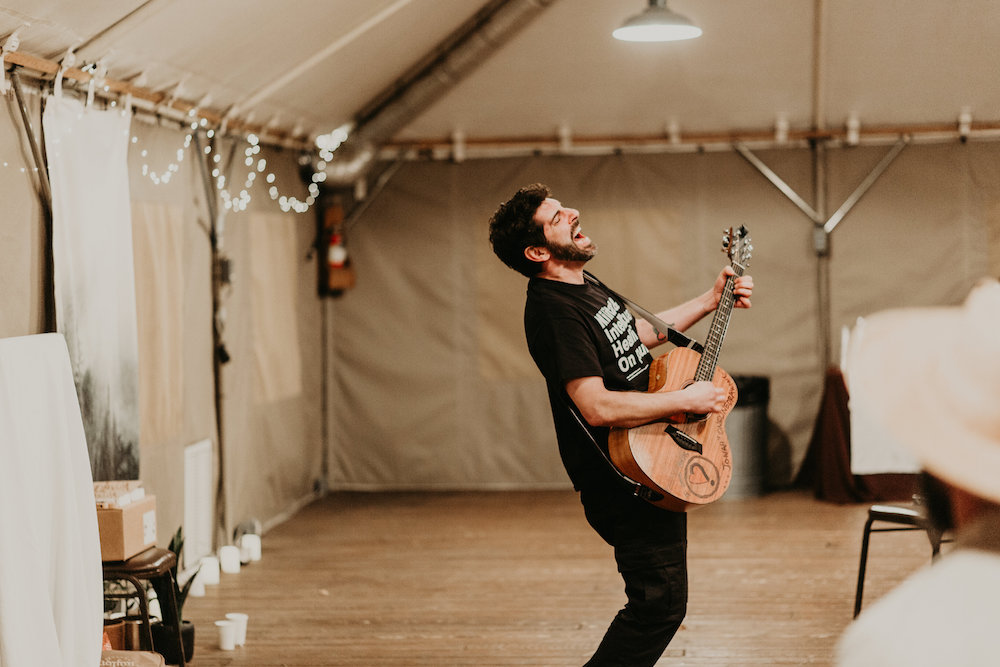
It seems to me that you embraced this eclectic, very non-pompous, very much putting yourself out there DIY approach to getting your music out after Far. I’m curious: when you first began writing songs for hire or performing in people’s living rooms – just branching out and doing it a different way – – what was some of the feedback from people, from other artists, what did they think about the way you started approaching it?
The reaction from other musicians regarding my general approach to performance and interaction has been they kind of think I’m nuts. I really don’t mean to be hyperbolic, but I’ve had a lot of people – when they see me at the merch table, or when they hear my ideas, or see I’m writing a song for someone’s wedding and then flying out to sing in someone’s basement – look at me like an animal they’ve never seen before. I’ve experienced a lot of musicians over the years kind of not trust my approach. They think I am sort of being fake when I’m just as interested in the personal part. People I’ve hung out with long enough know it’s not a put on, and it’s just a thing I aspire to. I’m interested in people, sincerely. It’s not just a marketing technique, and I think some fellow musicians sort of have this bemused respect – like this guy really does this weird shit and it’s sweet. Of course, it doesn’t feel good for people to think negative things about me, but the neat thing I figured out is if I can feel good about what I’m doing, if I can take a few breaths and feel solid about my approaches, then other people’s feedback doesn’t mean as much to me. That said, on a bad day, if I’m really insecure, I see other artists doing it so differently than me and go, huh – maybe I’ve got this entirely wrong. All I know is that personal part is definitely what has been the most consistent thing, that keeps lighting me up. Any time there is a colder transactional feel or the scale gets larger and the personal thing gets lost, I’m not as happy. When I feel safe is either when there are no rules and it’s purely free and improvised or where the agreements are really clear so I know what the rules are.
You seem to have a certain freedom, and conviction, with your political views and your consciousness and just kind of mixing them with your artistry. I’m curious, have you ever questioned sharing that part of yourself: your belief systems, your politics, just kind of integrating it all?
Yeah, I’ve been doing that for a long time. I remember when I was fifteen I wrote a song called “Get It Off Your Back” about the pharmaceutical industry and how terrible it was. I look back at that song and I don’t even remember thinking about any of that stuff. I was clearly very angry about something. I’ve always been very wary of social/political art. I don’t think it’s enough to make a song or a painting or a play about an intense subject. That doesn’t make it good art. I think, in fact, in the worst case, it can be someone using some really horrible shit in the world to get their name out there. If you write a terrible song about AIDS, then you just wrote a terrible song and made it worse cause you didn’t do what art is supposed to do: spark ideas and communication between people. I want to write songs that are tough to turn away from. The heavier the subject matter, the better I want the tune to be. I want it to be what a song should be. I want it to get into people’s heads and hearts in a way that music can uniquely do. Honestly, just the social network thing, it’s scary. I can’t even tell you how many people stop listening to my music or threatened me or have come up to me after a show or during a show, and said ‘Shut up and play your next song, we don’t want to hear your thoughts on the war’. It messes up my scale. I see my friends who are better known musicians than me try and talk about political things and get shut down, too.
It’s a constant challenge. I’m constantly checking myself because I can be judgmental, which is mostly about being scared to trust other people. I keep it at bay as much as possible, but I’m sure underneath it there is also a pragmatic ‘Shit, I don’t want to piss everyone off’. This is how I make my living. I try to be honest about that feeling, and it’s a bit like meditating, watching the thoughts go by. If I learn something that works, as a key to unlocking some system of oppression or larger issue, if there is something that helps me understand it better, I want to articulate it to other people. Not because I want people to agree with me, but it just excites me. It’s like a song to me. I want to figure out a way to write about the idea or sing about the idea that will give the best shot in the world for getting it understood.
So, it is a balancing act. Not only with my fear of people being mad at me, but also checking in with myself. I mean, I am complicit in this system of oppression and a lot about myself as a man these days is hard. A lot of women are speaking out about their experiences, and that makes me super uncomfortable. But I like to really dig into that discomfort and try to invite other people into that discomfort, because it’s a pretty beautiful thing to face it and consider what next. To know men are paid X amount more than women for no real reason. How does that feel? I would rather have fewer conversations from a moral standpoint and more from an emotional standpoint. When you look at the numbers of rape or domestic violence, how does that feel? Forget about everything you’ve thought about the roles of gender. You live in a world where that’s a true thing. It’s not an opinion, this stuff is happening. How do you deal with that? I like to talk about those things in a way that is as inviting as possible, whether it’s in the form of a song or otherwise. I want it to be good quality and I don’t want to lean on social issues to make my art have more gravity.
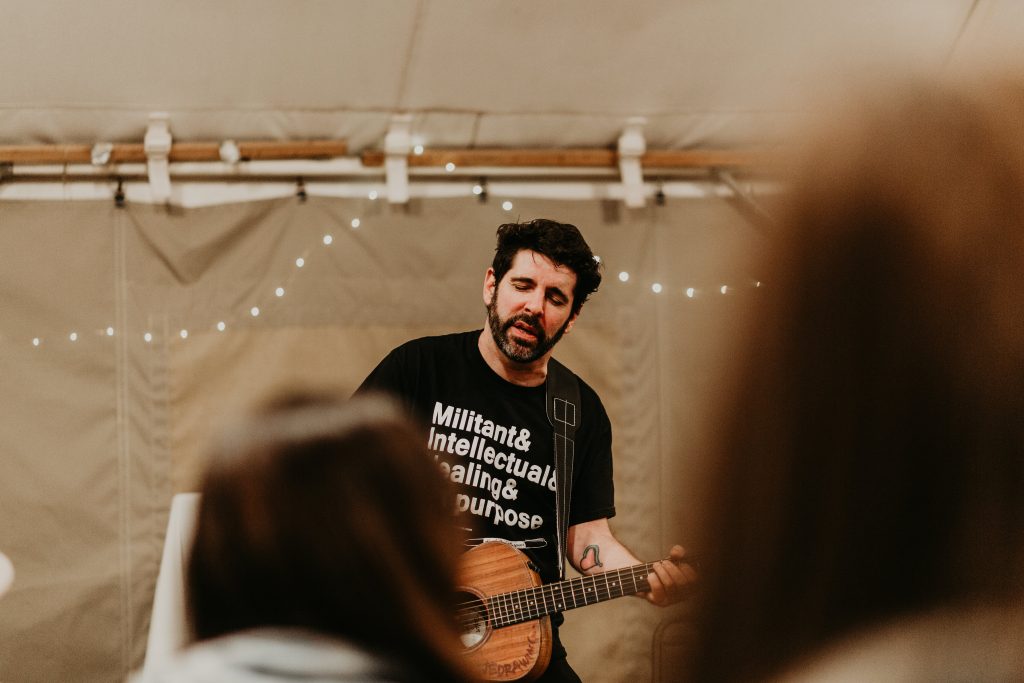
Thank you for articulating this so well, it’s so complicated.
Yeah, you know, it’s really fun for me think this out with you and to talk with you about this. We don’t really know each other, but we kind of know each other. I was just talking to my sweetheart about how nice it was to go down there (OTW Retreat) and be with all of you, and we still have our Of The Wolves bag hanging up! I like dialogue, and I’m gonna leave this conversation with these things on my mind.
My final question: what keeps you up at night? Not necessarily in a bad way, but maybe it’s something you desperately want to do in life or something you haven’t tackled yet, you know?
I really do, and its’ really good to hear that question right now, because everything I was saying about home, collaboration, trusting people and trusting myself, and learning to be a bit gentler and inviting and let my ideas out in different ways – those are the things that were keeping me up at night. And “finding home” is the ultimate phrase. A long time ago my friend Norman and I were talking when I was in a really bad place, talking about where I was gonna live, and he said, ‘Look, whatever you do, whether you stay where you are or you move somewhere else, you really need to choose home’. I had home with my daughter, but outside of that I was traveling a lot and yet didn’t want to be away for too long and also didn’t really have that much of a life outside of my fatherhood. When I was home, I didn’t really have a ‘home’. So, I would say that’s when the seeds were planted that led to where I am now. That was keeping me up at night then.
In terms of what’s keeping me up now – I have to say, and this feels good to say, too – I don’t have any sort of specific things that I’m scared I won’t achieve or that I’m dreaming of achieving. The focus for me is: however long I get to live (sure I’m scared of getting hit by a truck or dying from something awful) I just want to feel a deep and peaceful certainty that I really gave it a shot. That I didn’t just coast along on my privilege in whatever context and on this comfort-y kind of thing. I want to be peaceful, but I don’t want to be stagnant. When I turned 40 (I’m 48 now) I looked back at when I was 20. There were things that I kind of knew at 20 about myself that I probably should have been working on these last 20 years and wasn’t. There’s this thing I wrote once that keeps coming back to me; ‘If you let your habits harden for too long, you can get to a place you can’t make it back from.’ And that’s where I’m at, honestly just staying limber and fit and flexible, literally and figuratively. I’m literally moving my body more consciously these days. I’m really trying to be more tender and flexible with my creativity and in my interpersonal relationships. I like using limitations – and mortality is the ultimate limitation – as a kind of inspiration. I’m looking a bit more at the elderly, too, thinking if I’ve learned anything good or have anything to offer how can I pass that on to someone younger than me? To someone without as many resources as me. How can I be of service? I’m thinking a lot about that these days. I’m thinking about my place as someone who has been through some shit and maybe can offer a bit of light the same way I needed some when I was younger. There were some older people who really helped me along, so I’m kind of looking to be that for other people.
That’s more earthy and pragmatic as opposed to obsessing about some sort of output or larger issues – which I know you do concern yourself with – that far surpass your reach.
Yeah, activism is a tough thing. Of course, I would love to fix systemic racism and dismantle the patriarchy all by myself, but that in some ways is what leads me to go, ‘Oh, I need to focus on being open and working through whatever fears I have towards others. I gotta check that out so I can work with people’. I know I talked about seeing burnt out musicians, and I’ve seen a lot of burnt out activists. I think they get stuck on things like change isn’t coming quickly enough, and, I don’t know, maybe that is a trait of the human race that will never go away. It just doesn’t seem sustainable in a way that’s very liberating for me. I’m sure someone way smarter than me has said this better, but there’s an idea that focusing only on the desired result is pretty much the source of pain. I believe that pretty firmly. I do my best, pretty consistently, to let that go. In terms of earthy, I read a book a little while ago that really messed with my thoughts about language and literacy. So, I’ve been enjoying silence a lot more these days. I’ve been enjoying shutting up. I’ve been enjoying just taking a walk and being with a tree or being with a non-human animal. At the same time, I want to enjoy people and learn to trust, but I don’t want to be too human obsessed. There’s so much more out there besides people. You know when you go around in a circle and say your preferred gender pronoun? I want to be an “it”. I don’t want to be a “he” or a “she”, I want to be an “it”. I’m a creature. I like being a creature. That is the way I’m framing whatever comes next, too. I want to live as a creature.
Follow Jonah |Facebook + Website + Instagram

